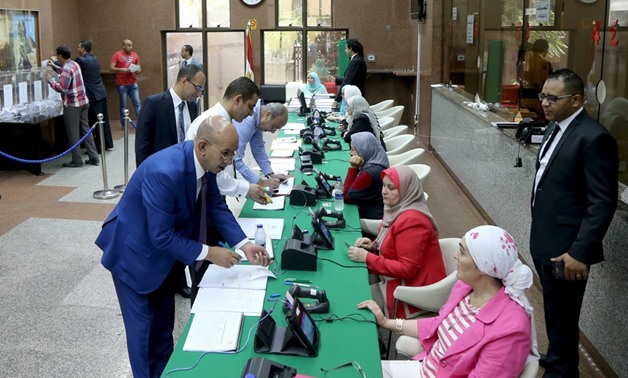
Egyptians living abroad (L) register their information to cast their votes during the first stage of Egypt's parliamentary election at the Egyptian consulate in Dubai, October 17, 2015 (Reuters)
CAIRO – 12 March 2018: About 9.5 million Egyptians eligible to participate in the upcoming presidential election are getting ready to cast their ballots on March 16, 17 and 18, in 124 countries all over the world in their respective embassies, consulates and diplomatic missions. Only four countries will be excluded due to political reasons; Syria, Yemen, Libya and Somalia.
The actual number of Egyptians abroad could exceed the announced number by the Central Agency for Public Mobilization and Statistics (CAPMAS), which is 9.5 million, according to Minister of Immigration Nabila Makram. This is mainly because “there is a number of Egyptians currently living outside; however their data is not registered with the embassies,” Makram said during an interview with MENA news agency in February.
“During my tour to meet with Egyptian communities abroad, they expressed their keenness to participate in the political process at any time. Their enthusiasm exceeded my expectations,” Makram added during her interview.
Here is a number of the most important questions and answers regarding the presidential election process abroad; including detailed information about the required documents and procedures:
Who has the right to vote abroad?
Well, every Egyptian who lives abroad has the right to vote, as long as his/her name is registered in the voter’s database.
What are the needed documents for Egyptians abroad to be able to participate in the elections?
An ID (national identity card or passport); the national identity card doesn't necessarily need to be valid, it can be an ID that has expired; unlike the passport which needs to be valid.
Where will the voting take place?
Voting will take place inside Egyptian embassies, consulates or any diplomatic mission’s headquarters as per the Ministry of Foreign Affairs’ nomination. Egyptians abroad are eligible to vote at any embassy without being restricted to the location mentioned inside the passport.
Who is supervising the elections abroad?
A number of high-profile diplomats, accompanied with members of the Ministry of Foreign Affairs’ representatives.
What would invalidate a vote?
Not choosing any of the candidates, writing one’s name on the ballot paper, marking any special signs, or writing a personal opinion or comment. Also, using pencils instead of pens will invalidate the voting, as will using a ballot paper without sealing it. A voter cannot participate in the election twice.
The Ministry of Foreign Affairs will be monitoring the election process live during the three days, along with the National Elections Authority (NEA), especially in the countries that have the largest number of Egyptian communities such as Britain, the United States of America, France and the Arab countries.
Starting March 14, the ‘electoral silence’ period will commence for the elections abroad. In the two following days, March 14 and 15, no presidential propaganda will be allowed.
Domestically, voting will take place for three days starting March 26. The winning candidate will be announced on April 2. Sixty million eligible voters will cast their ballots in the election.
In February, the NEA announced the final list of candidates, including current President Abdel Fatah al-Sisi and Head of al-Ghad Party Moussa Moustafa Moussa. Sisi chose a star as his symbol in the election, while Moussa chose a plane.
Sixty-two national and international non-governmental and civil society organizations will observe the 2018 Egyptian election, according to the regulations of Law no. 8 of 2018, issued by the NEA, headed by Judge Lashen Ibrahim.


Comments
Leave a Comment